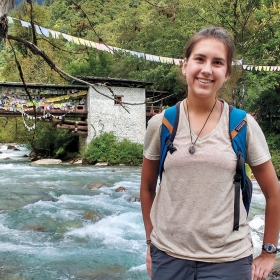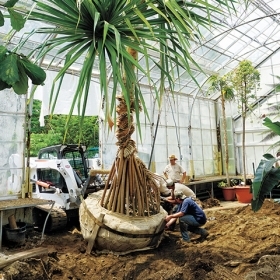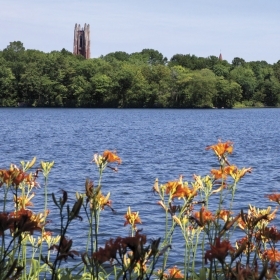Jenn Harris ’19, a biology major, is studying Himalayan ecology and land use and resource management in Bhutan.

Name: Jenn Harris ’19
Major: Biology
Hometown: Vestal, N.Y.
Program: School for Field Studies, Bhutan—Himalayan Environment and Society in Transition
Why Bhutan?
I’m passionate about sustainable development and ecology. Bhutan is a nation where those two interests intersect. Bhutan has committed to staying carbon neutral and maintaining 60 percent forested areas, but at the same time, it only became a democracy in 2007 and is rapidly developing. The reconciliation of the forces of growing industry and population with a historical Buddhist desire to preserve nature is not an easy one, but all the more interesting for it.
What kind of courses are you taking?
I’m taking four classes: Himalayan ecology; land use and resource management; political ecology of development; and a language and culture course. (Dzongkha is the national language of Bhutan, but 19 languages are spoken through the nation.) The coursework culminates in directed research in our last month of study. Every day of classes is different, with a variety of field exercises and guest lectures. Just in the last week, I’ve been lectured by a Buddhist monk, learned the local plants on a hike, and visited a local mushroom farmer to learn about small entrepreneurs’ role in the larger southeast Asian market, all in the majestic shadow of the Himalayas.
Where are you living?
I’m living at the SFS campus center in Paro, Bhutan. The space used to be a small resort, surrounded by the mountains next to the Paro river.
What’s your favorite part of your daily routine?
I love running in the morning. Watching the foggy town of Paro wake up surrounded by Himalayas leaves me awestruck. I run next to the river coursing with glacial water and watch the sun creep over the mountaintops. I run varsity track for Wellesley, and although I miss my team, it’s great to still run here.
What has surprised you most about Bhutan?
I had no idea what to expect coming to Bhutan. The amount of Western influence is surprising. It’s interesting that in the course of its development, Bhutan to some extent strives to be more like the U.S.

